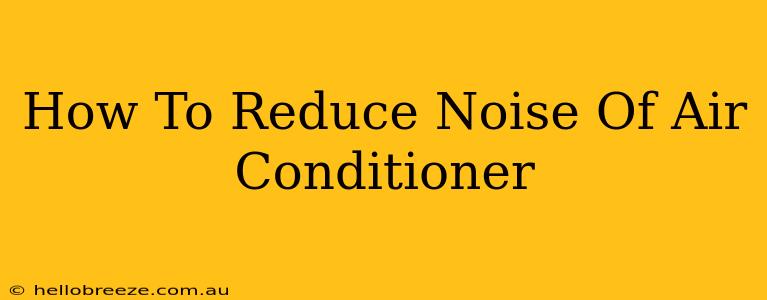Is your air conditioner driving you crazy with its incessant noise? A noisy AC unit can significantly impact your comfort and peace of mind. Luckily, there are several things you can do to reduce the noise and reclaim the quiet enjoyment of your home. This guide will walk you through practical solutions, from simple DIY fixes to more involved professional services.
Understanding the Sources of AC Noise
Before tackling solutions, it's helpful to understand where the noise is coming from. Common sources of air conditioner noise include:
- Compressor: This is the heart of your AC unit, and it's often the loudest component. Noises can range from a low hum to a more concerning rattling or clanking.
- Fan Motors: Both the indoor and outdoor fan motors can produce noise, particularly if they're worn, unbalanced, or obstructed. You might hear a whirring, buzzing, or squeaking sound.
- Refrigerant Leaks: A hissing sound could indicate a refrigerant leak, a serious problem that needs immediate professional attention. Do not attempt to fix this yourself.
- Loose Parts: Vibrations can cause loose parts to rattle. This is often a simple fix but can be annoying if left unaddressed.
- Airflow Restrictions: Obstructions in the air vents or ductwork can cause the system to work harder and create more noise.
- Outdoor Unit Location: The placement of your outdoor unit can affect noise levels. Proximity to walls, fences, or other structures can amplify sound.
DIY Solutions to Reduce AC Noise
Several simple steps can significantly reduce the noise coming from your air conditioner:
1. Check for Loose Parts:
- Inspect the outdoor unit: Look for any loose panels, screws, or debris that might be rattling against the unit. Tighten any loose screws or fasteners.
- Check the indoor unit: Similarly, examine the indoor unit for loose parts.
2. Clean the Air Filters:
- Clogged filters restrict airflow, forcing the system to work harder and generate more noise. Regularly clean or replace your air filters according to the manufacturer's recommendations.
3. Improve Airflow:
- Clear any obstructions: Ensure nothing is blocking the air vents or the outdoor unit. Remove leaves, debris, and any other obstructions.
- Check the ductwork: If you have access to your ductwork, inspect it for leaks or blockages. Properly sealed ducts improve airflow and reduce noise.
4. Address Vibrations:
- Use vibration dampeners: You can purchase rubber pads or mounts specifically designed to reduce vibrations from air conditioners. Place these between the unit and the surface it rests on.
- Secure the unit: Make sure the unit is firmly mounted and doesn't have any excessive movement.
When to Call a Professional
While many noise issues can be addressed with DIY solutions, some problems require professional expertise:
- Refrigerant Leaks: A hissing sound often indicates a refrigerant leak. This is a serious problem that needs immediate professional attention. Attempting to fix this yourself can be dangerous.
- Compressor Issues: If you hear loud banging, knocking, or other unusual noises from the compressor, it's best to call an HVAC technician for a thorough inspection.
- Persistent Noise After DIY Attempts: If you've tried the DIY solutions and the noise persists or worsens, it's time to call a professional for diagnosis and repair.
Preventing Future AC Noise Problems
Regular maintenance is key to preventing excessive AC noise:
- Schedule annual maintenance: Professional maintenance includes cleaning, inspection, and lubrication of moving parts, minimizing the risk of future noise issues.
- Clean filters regularly: As mentioned earlier, regular filter cleaning is crucial for optimal performance and noise reduction.
- Proper installation: Ensure your air conditioner is professionally installed to avoid future problems.
By following these tips and taking proactive steps, you can significantly reduce the noise from your air conditioner and enjoy a more peaceful and comfortable home environment. Remember, addressing noise problems early can prevent more significant and costly repairs down the line.

